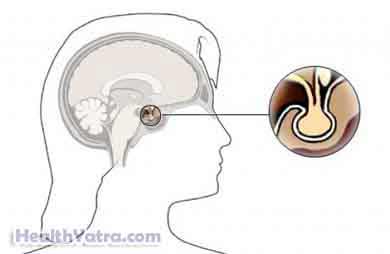Definition
The pituitary gland is found at the base of the brain. It produces several important hormones that control the production of other hormones made by glands in the body. In panhypopituitarism, the gland produces an insufficient amount of hormones.

Causes
This condition is most often caused by damage to the gland. In adults, it is usually a result of pituitary surgery. In children, damage to the pituitary gland may be caused by:
- Infection
- Stroke
- Genetic factors
- Tumor on or near the pituitary gland
- Cancer that has spread
- Injury
- No known cause
Risk Factors
These risk factors increase your chance of developing panhypopituitarism. Tell your doctor if you have any of these risk factors:
- Damage to the pituitary gland (eg, trauma, radiation, cancer spread, postpartum hemorrhage)
- Tumor on the pituitary gland
Symptoms
Compression of the Tumor
Compression of the tumor on local structures, especially the nerves of the eyes, can cause:
- Blurred vision
- Loss of visual field
- Poor temperature control
Insufficient Hormones
- Insufficient levels of gonadotropins can cause:
- In premenopausal women: missed menstrual cycles, infertility, osteoporosis, vaginal dryness, loss or reduction in female characteristics
- In men: impotence, reduced size of testes, decreased production of sperm,infertility, breast enlargement, reduced muscle mass, loss or reduction in male characteristics (eg, beard growth)
- Insufficient levels of growth hormone can cause:
- In children: stunted growth or dwarfism
- In adults: weakness, obesity, reduced cardiac output, low blood sugar levels, and reduced exercise tolerance
- Insufficient levels of thyroid-stimulating hormones can lead to:
- Underactive thyroid, which causes confusion, hair loss, weakness, slow heart rate, muscle stiffness, intolerance to cold, constipation, weight gain, and dry skin
- Insufficient corticotrophic levels can lead to:
- Underactive adrenal gland, which causes low blood pressure, low blood sugar, fatigue, weight loss, vomiting, and low stress tolerance—This can be life-threatening.
- Excessive prolactin levels can cause:
- In women: missed periods, infertility, and milk secretion
- In men: reduced facial and body hair, small testes
Diagnosis
Your doctor will ask about your symptoms and medical history. A physical exam will be done.
Tests may include the following:
- MRI scan —a test that uses magnetic waves to make pictures of structures inside the body
- Blood tests—Blood tests—to measure pituitary, as well as target gland hormone levels
- Stimulation tests—to test the maximum capacity of the endocrine glands, usually of the pituitary gland
- Semen analysis—in males suspected of infertility
Treatment
Talk with your doctor about the best plan for you. Treatment depends on the cause of the condition. The goal of treatment is to restore normal blood hormone levels of thyroid, adrenal, estrogen or testosterone, and sometimes growth hormone.
Treatment options include:
- Hormone replacement therapy—based on what types of hormones are missing
- Tumor removal—done if the cause of the damage is a tumor
- Radiation therapy —done if the cause of the damage is a cancer or tumor
Prevention
The majority of causes are not preventable. Injury prevention can prevent some cases.
